The Clinical Immunodiagnostics Market is estimated to be valued at USD 5.6 billion in 2025 and is projected to reach USD 9.4 billion by 2035, registering a compound annual growth rate (CAGR) of 5.4% over the forecast period.
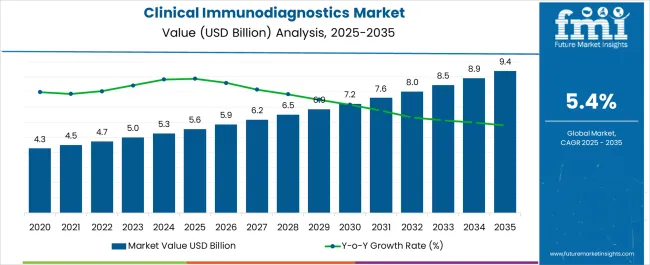
| Metric | Value |
|---|---|
| Clinical Immunodiagnostics Market Estimated Value in (2025 E) | USD 5.6 billion |
| Clinical Immunodiagnostics Market Forecast Value in (2035 F) | USD 9.4 billion |
| Forecast CAGR (2025 to 2035) | 5.4% |
The clinical immunodiagnostics market is expanding steadily, driven by rising demand for precise and rapid diagnostic solutions to support early disease detection and management. Industry publications and healthcare reports have emphasized the growing reliance on immunoassay-based platforms in clinical laboratories, hospitals, and point-of-care settings. The increasing prevalence of infectious and chronic diseases has amplified the demand for advanced diagnostic tools that provide high sensitivity and specificity.
Technological progress in assay automation and multiplexing has reduced turnaround times, supporting clinical decision-making and improving patient outcomes. Regulatory approvals for innovative diagnostic kits and continued investments by biotechnology firms have broadened product availability.
Moreover, the adoption of immunodiagnostics in routine screening programs and epidemiological surveillance has been accelerated by global health initiatives. Looking forward, market growth is expected to be reinforced by digital integration in laboratory workflows, expanding applications in precision medicine, and the rising importance of immunodiagnostics in infectious disease monitoring and chronic disease management.
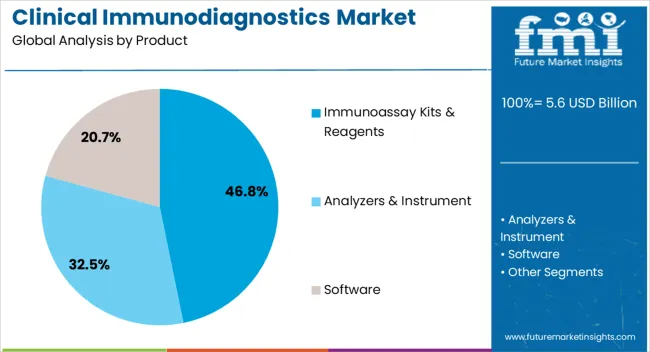
The Immunoassay Kits & Reagents segment is projected to account for 46.8% of the clinical immunodiagnostics market revenue in 2025, establishing itself as the leading product category. This dominance has been supported by their widespread use in clinical laboratories for detecting a broad spectrum of biomarkers with high accuracy. Healthcare providers have increasingly relied on these kits due to their scalability, standardization, and compatibility with automated diagnostic systems.
Continuous advancements in assay formats, including chemiluminescent and enzyme-linked immunoassays, have enhanced diagnostic sensitivity, driving greater adoption.
Additionally, the recurring nature of reagent consumption has contributed to consistent market demand, ensuring strong revenue generation for suppliers. As clinical laboratories focus on efficiency and reliability in diagnostics, immunoassay kits and reagents are expected to sustain their leadership in the product segment.
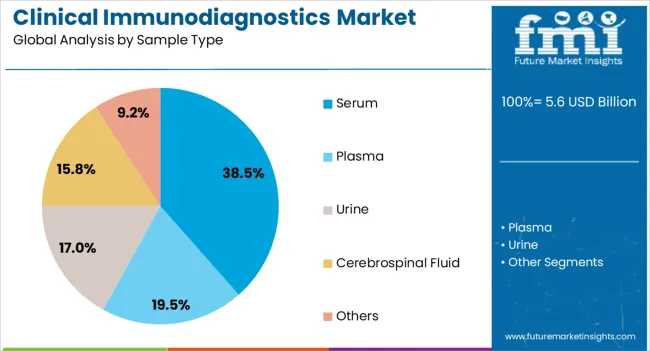
The Serum segment is projected to contribute 38.5% of the clinical immunodiagnostics market revenue in 2025, maintaining its position as the dominant sample type. Serum has been favored in immunodiagnostic testing due to its stability, ease of handling, and ability to provide reliable insights into a wide range of disease biomarkers. Clinical studies have reinforced serum’s diagnostic relevance for infectious, autoimmune, and metabolic disorders, ensuring its routine use in diagnostic laboratories.
Moreover, established infrastructure for serum collection and storage has supported its integration into both centralized laboratories and decentralized testing facilities.
The compatibility of serum with advanced assay platforms has further cemented its dominance as the preferred sample type. As diagnostic technologies continue to evolve, serum-based testing is expected to remain central to clinical immunodiagnostics due to its proven reliability and clinical acceptance.
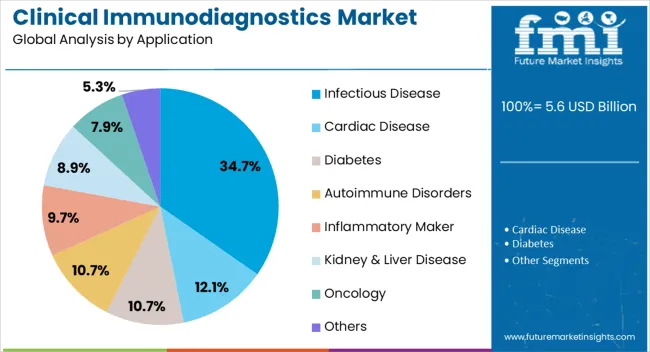
The Infectious Disease segment is projected to account for 34.7% of the clinical immunodiagnostics market revenue in 2025, securing its position as the leading application. Growth of this segment has been driven by the persistent global burden of infectious diseases and the necessity for accurate, rapid diagnostic tools to guide treatment decisions. Public health programs and hospital protocols have increasingly integrated immunoassay-based tests for detecting bacterial, viral, and parasitic infections, highlighting their role in outbreak control and patient management.
Innovations in immunodiagnostic platforms have enhanced detection capabilities for emerging pathogens, strengthening their application in infectious disease surveillance.
Furthermore, government-supported screening programs and the expansion of point-of-care diagnostics have boosted accessibility to immunodiagnostic solutions. As global health systems continue to prioritize infection control and epidemic preparedness, the Infectious Disease segment is expected to remain the most significant application within the clinical immunodiagnostics market.
The global market for clinical immunodiagnostics was around 3.7% of the overall USD 5.6 Billion of the global in vitro diagnostics market in 2025.
The market has experienced significant growth over the years. The increasing prevalence of infectious diseases, autoimmune disorders, and cancer, coupled with advancements in immunodiagnostic technologies, has contributed to the expansion of the market.
The introduction of novel assays improved the sensitivity and specificity of tests, and the adoption of automated platforms has played a key role in the historic growth of the clinical immunodiagnostics market. The global burden of infectious diseases, chronic diseases, and conditions related to the immune system is expected to rise continuously in the coming years.
This will drive the demand for accurate and reliable diagnostic tests, including clinical immunodiagnostics. Also, the need for early disease detection, personalized medicine, and effective monitoring of treatment outcomes will fuel market growth.
Ongoing advancements in immunodiagnostic technologies, such as multiplex assays, high-sensitivity detection methods, and point-of-care testing, are expected to enhance the performance and accessibility of clinical immunodiagnostics. These technological advancements will enable rapid and accurate diagnosis, resulting in increased adoption and market growth.
Owed to the above factors, the global market is projected to grow at a CAGR of 5.4% in the forecasted period.
Clinical Immunodiagnostics are essential in personalized medicine because it helps in facilitating the diagnosis and monitoring of diseases at an individual level. As the demand for personalized treatment options continues to rise, clinical immunodiagnostics product manufacturers have an opportunity to develop innovative assays that enable targeted therapies and precision medicine.
The integration of clinical immunodiagnostics with therapeutics, particularly in oncology, presents opportunities for manufacturers. As targeted therapies become more prevalent, the demand for companion diagnostics is likely to grow. Developing tests that identify patients who will respond positively to specific treatments can enhance the effectiveness of therapies and reduce healthcare costs. Manufacturers can collaborate with pharmaceutical companies to develop companion diagnostic assays that enhance treatment selection and personalized patient care. This would present numerous opportunities for the growth of this market.
Clinical immunodiagnostics can involve high costs, including the development and production of assays, instruments, and reagents. The high costs associated with immunodiagnostic tests can limit their accessibility and affordability, particularly in resource-constrained settings or regions with limited healthcare budgets. Cost considerations can impact the demand for clinical immunodiagnostics.
Apart from this, clinical immunodiagnostics faces competition from alternative diagnostic technologies, such as molecular diagnostics, imaging techniques, and other non-immunological assays. These alternative technologies may offer advantages in terms of sensitivity, specificity, multiplexing capabilities, or cost-effectiveness in certain applications. The availability of alternative diagnostic options can limit the demand for clinical immunodiagnostics.
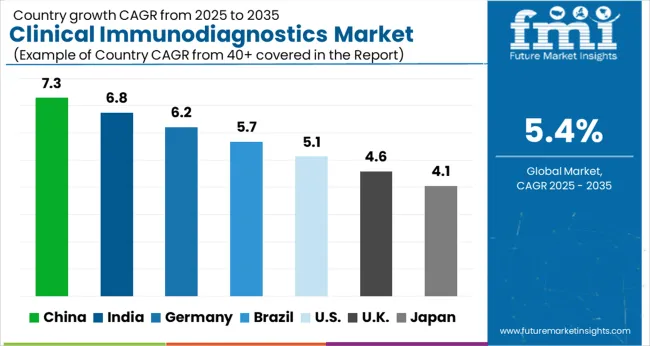
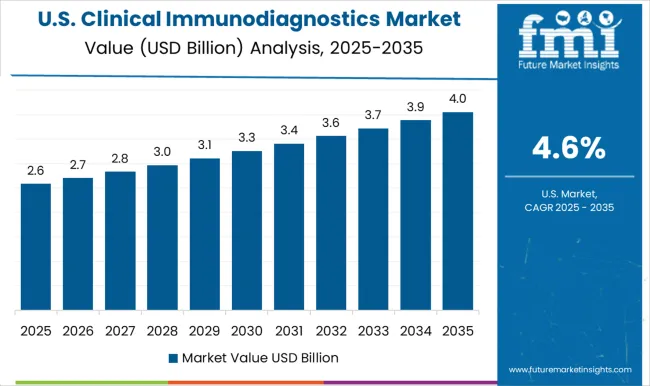
The USA occupies 91.1% of the North America market in 2025. Reimbursement policies play an important role in the adoption of medical technologies. In the USA, favorable reimbursement policies for clinical immunodiagnostics testing have supported market growth. Reimbursement coverage by government programs like Medicare and private insurance companies has incentivized healthcare providers to offer clinical immunodiagnostic-based diagnostics.
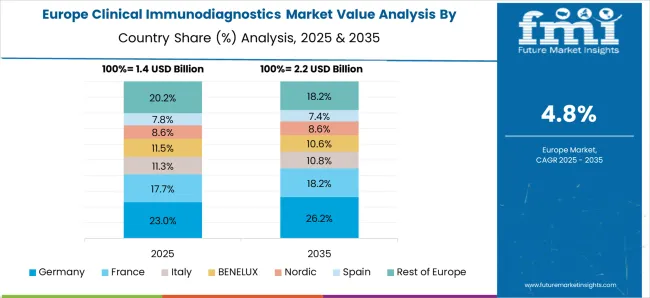
Germany’s expenditure in clinical immunodiagnostics in 2025 was USD 5.6 Million. Personalized medicine, which involves tailoring medical treatment to individual patients based on their genetic profile, is gaining prominence in this region. Germany, known for its strong healthcare and research infrastructure, is actively participating in personalized medicine initiatives. Clinical immunodiagnostics being essential in identifying specific biomarkers for personalized medicine drives the demand for various kits and reagents in the country.
In 2025, China held a significant share of the East Asia market and is expected to grow at a CAGR of close to 6.4% over the forecast period. Chinese clinical immunodiagnostics manufacturers are increasingly collaborating with international companies, leveraging expertise, technologies, and market access. These collaborations help in technology transfer, product development, and expanding the market reach of clinical immunodiagnostics in China. Also, partnerships with healthcare providers and research institutions contribute to the growth of the clinical immunodiagnostics market in China.
By product, immunoassay kits & reagents held 67.8% market share in the world in 2025 and are expected to expand rapidly with a CAGR of 5.4% from 2025 to 2035. Immunoassay kits and reagents have a broad range of applications in clinical immunodiagnostics, covering various disease areas, including infectious diseases, autoimmune disorders, oncology, cardiovascular diseases, and endocrinology. Their versatility and adaptability to different analytes make them essential tools for diagnosing and monitoring a diverse set of medical conditions.
The market value of serum sample type was USD 5.6 Billion, representing a sizable 35.4% market share in 2025. Serum samples are readily available and routinely used in clinical practice. Healthcare facilities and laboratories can easily collect serum samples from patients for diagnostic testing, making them a convenient and accessible source of biomaterial for immunodiagnostics.
By application, infectious disease accounted for a prominent share of the global market, with a revenue share of 20.7% in 2025. Infectious diseases are widespread and continue to pose a significant global health burden. The high prevalence of infectious diseases, such as influenza, HIV/AIDS, hepatitis, tuberculosis, and various respiratory infections, drives the demand for diagnostic tests based on immunodiagnostics.
With a 26.1% value share in 2025 and a strong CAGR of 6.4% over the projected period, the hospital has a sizable position in this market. Hospitals cater to a large number of patients with diverse medical conditions. As a result, they have a substantial demand for diagnostic testing, including clinical immunodiagnostics. Hospitals frequently utilize immunodiagnostic tests to aid in the diagnosis and inspection of various diseases.
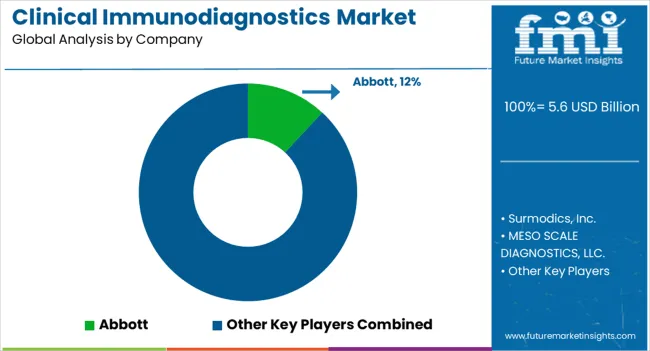
Collaborations with medical professionals, academic institutions, and IT companies can promote creativity and speed up clinical immunodiagnostics. Also, collaboration in research, development, and commercialization can result in new applications and a larger market. The market for clinical immunodiagnostics is dominated by multiple sizable businesses. The important advances of the major companies in this market are illustrated by the following examples:
Similarly, recent developments related to the companies, manufacturing the clinical immunodiagnostics products have been tracked by the team at Future Market Insights, which are available in the full report.
| Report Attributes | Details |
|---|---|
| Forecast Period | 2025 to 2035 |
| Historical Data Available for | 2020 to 2025 |
| Market Analysis | USD Million for Value, Units for Volume |
| Key Regions Covered | North America; Latin America; Europe; East Asia; South Asia; Oceania; Middle East and Africa (MEA) |
| Key Countries Covered | USA, Canada, Brazil, Mexico, Argentina, United Kingdom, Germany, Italy, France, Spain, BENELUX, Russia, China, Japan, South Korea, India, Indonesia, Thailand, Malaysia, Australia, New Zealand, GCC Countries, Türkiye, South Africa and Northern Africa |
| Key Market Segments Covered | Product, Sample Type, Application, End User, and Region |
| Key Companies Profiled | Surmodics, Inc.; MESO SCALE DIAGNOSTICS, LLC.; Abbott; Siemens Healthineers; PerkinElmer Inc.; Becton, Dickinson and Company; Thermo Fisher Scientific Inc.; Zoetis Inc.; Promega Corporation; F. Hoffmann-La Roche; BIOMÉRIEUX SA; Elabscience Biotechnology Inc.; Innovative Research, Inc.; QIAGEN N.V.; Merck KGaA; Bio-Rad Laboratories, Inc.; Creative Diagnostics; Cell Signaling Technology (CST); NEW HORIZONS DIAGNOSTIC CORPORATION; DiaSorin S.p.A.; H.U. Group Holdings Inc; IDEXX Laboratories Inc.; Randox Laboratories Ltd.; Biopanda Reagents Ltd.; Shenzhen Bioeasy Biotechnology Co., Ltd.; Quidel Corporation; Advnt Biotechnologies.; RESPONSE BIOMEDICAL.; Danaher Corporation |
| Report Coverage | Market Forecast, Competition Intelligence, DROT Analysis, Market Dynamics and Challenges, Strategic Growth Initiatives |
| Pricing | Available upon Request |
The global clinical immunodiagnostics market is estimated to be valued at USD 5.6 billion in 2025.
The market size for the clinical immunodiagnostics market is projected to reach USD 9.4 billion by 2035.
The clinical immunodiagnostics market is expected to grow at a 5.4% CAGR between 2025 and 2035.
The key product types in clinical immunodiagnostics market are immunoassay kits & reagents, analyzers & instrument and software.
In terms of sample type, serum segment to command 38.5% share in the clinical immunodiagnostics market in 2025.






Full Research Suite comprises of:
Market outlook & trends analysis
Interviews & case studies
Strategic recommendations
Vendor profiles & capabilities analysis
5-year forecasts
8 regions and 60+ country-level data splits
Market segment data splits
12 months of continuous data updates
DELIVERED AS:
PDF EXCEL ONLINE
Clinical Trial Biorepository & Archiving Solution Market Size and Share Forecast Outlook 2025 to 2035
Clinical Chairs Market Size and Share Forecast Outlook 2025 to 2035
Clinical Avian Nutrition Market Analysis - Size, Share, and Forecast Outlook 2025 to 2035
Clinical Workflow Solution Market Size and Share Forecast Outlook 2025 to 2035
Clinical Trials Support Software Solutions Market Size and Share Forecast Outlook 2025 to 2035
Clinical Research Organization Market Size and Share Forecast Outlook 2025 to 2035
Clinical Trial Packaging Market Size and Share Forecast Outlook 2025 to 2035
Clinical Mobility Market Size and Share Forecast Outlook 2025 to 2035
Clinical Communication and Collaboration Market Size and Share Forecast Outlook 2025 to 2035
Clinical Oncology Next-generation Sequencing Market Analysis - Size, Share, and Forecast 2025 to 2035
Clinical Decision Support Systems Market Size and Share Forecast Outlook 2025 to 2035
Clinical Trials Market Analysis - Size, Share, and Forecast 2025 to 2035
Clinical Refractometer Market Size and Share Forecast Outlook 2025 to 2035
Clinical Next-Generation Sequencing (NGS) Data Analysis Market Analysis by Solution and Services, Technology, End User, and Region through 2035
Clinical Hand Hygiene Products Market – Trends, Growth & Forecast 2025 to 2035
The Clinical Alarm Management Market is segmented by component, deployment mode and end user from 2025 to 2035
Clinical Nutrition Market Insights – Trends & Forecast 2025 to 2035
Clinical Diagnostics Market Insights – Size, Share & Forecast 2025 to 2035
Clinical Information System Market Analysis - Growth & Forecast 2024 to 2034
Clinical Chemistry Analyzers Market Trends – Demand & Forecast 2024 to 2034

Thank you!
You will receive an email from our Business Development Manager. Please be sure to check your SPAM/JUNK folder too.
Chat With
MaRIA